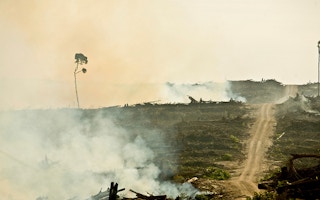Banks have financed companies responsible for rainforest destruction in Southeast Asia to the tune of billions of dollars, a study showed Tuesday, and called on lenders to stop “fuelling forest crime”.
Southeast Asia is home to some of the world’s most diverse rainforests, but they have come under threat in recent years due to large-scale expansion in industries such as palm oil, pulp and paper, rubber and timber.
The new study found at least $38 billion worth of commercial loans and underwriting facilities were provided to 50 companies in these sectors between 2010 and 2015, for their production or processing operations.
The figures were derived from a new research tool aimed at examining how firms linked to deforestation are financed. It was developed by the California-based Rainforest Action Network (RAN), Indonesia-based community group Tuk Indonesia and Dutch consultancy Profundo.
“
The devastating forest and land fires of 2015 and new fires in 2016 can be seen as one such impact, but so far none of the financiers have been held responsible for their role in enabling plantation expansion.
Rahmawati Retno Winarni, executive director, Tuk Indonesia
“This research suggests that banks continue to turn a blind eye to the devastating impacts of their financial services,” RAN forest and finance campaign director Tom Picken said.
“Only tightened financial sector regulation is capable of setting the kind of binding standards needed to stop banks fuelling forest crime,” he added.
The groups hoped the tool would highlight the impact of such lending and financing on forests and local communities, and the industry could impose mandatory requirements on banks and investors to conduct due diligence before credit approval.
“The devastating forest and land fires of 2015 and new fires in 2016 can be seen as one such impact, but so far none of the financiers have been held responsible for their role in enabling plantation expansion,” Rahmawati Retno Winarni, executive director at Tuk Indonesia said.
Indonesia has been criticised by green groups and its Southeast Asian neighbours for failing to stop the region’s annual haze, largely caused by fires started to cheaply clear forests and land for plantations.
Indonesian police have arrested 454 individuals in forest fire cases so far this year compared to 196 in 2015, when large parts of the region were blanketed in the toxic smoke, the worst in recent years.
This story was published with permission from Thomson Reuters Foundation, the charitable arm of Thomson Reuters, that covers humanitarian news, women’s rights, trafficking, property rights and climate change. Visit http://news.trust.org.

















